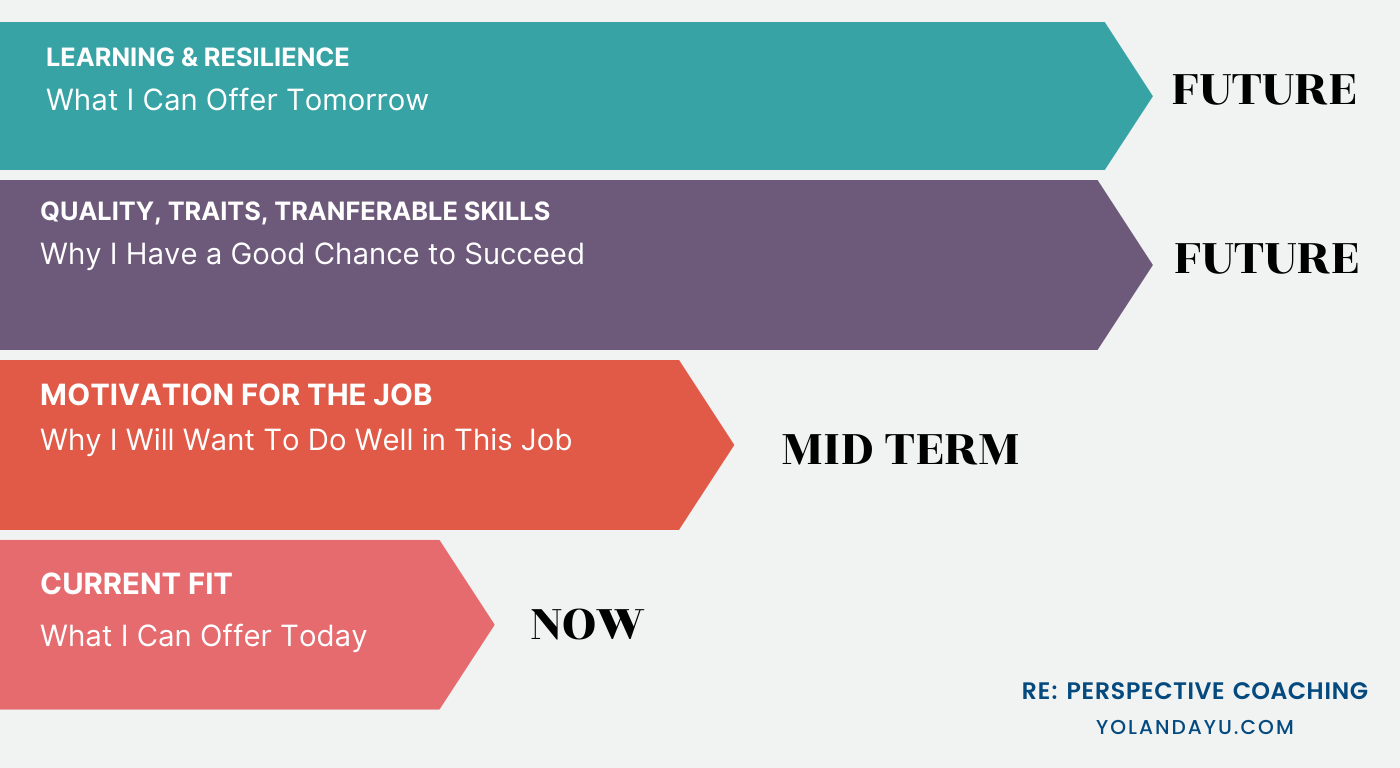Many of us feel inadequate in the interview process when we consider ourselves underqualified regarding skills, experience, or even personality. We feel stressed days before the interview. Though we try very hard to show up confidently, the anxiety stirring in our belly often tells ourselves (and the interviewer) a different story. An otherwise confident, eloquent individual shrinks and loses their shine.
What is happening?
Our minds entered a narrow tunnel to focus solely on the hiring company’s interest as if only their terms matter.
“My Terms Matter, Too”
We evaluate ourselves against the hiring company’s Job Description (along with our assumptions), only to conclude with desperation – how small our chances seem!
But the reality is that both interviewer and interviewee have the power to assess each other. Both parties can accept, reject, or negotiate with the other party, depending on their needs. While the power of both sides may not be equal, the hiring process should be concluded only on both parties’ terms. In simpler words: it should work for you, too.
Go to the negotiation table, oops, no, the interview room (but really, they are the same thing) with a new mindset – my terms matter, too.
The job looks attractive on the outside. But since I don’t work in this job, I can’t be sure: Will it be fulfilling for me? Will it contribute to the career aspiration I have? Will it fulfill my other needs or demands extra resources from me? Could you help me to learn more?
Instead of being at the hiring company’s mercy, you will again feel an “equal” to them. Such positioning makes you feel more confident and genuinely explore the role in your best interest.
Optimism Blossoms in Possibility
Pessimists say, “I have only a 5% chance for this interview because I have few relevant skills. And they have ideally wanted someone with a similar background.”
Optimists say, “I have a 50% chance because they called me for an interview. I will take a chance, bring out my best to connect all the dots.”
Both are perhaps right. Pessimists are right about the status quo, assuming they cannot change anything at the interview. Optimists are right about the potential, knowing they can influence the interview’s outcome.
But having a better outcome matters more than being right. Choose your self-prophecy carefully since you have decided to go for that interview, after all.
We have a natural tendency to choose pessimism. By being victims of circumstances, we escape from taking responsibility (Nothing I can do about it!) and potential failure (I’ll feel so bad about myself if I try and still fail.)
Which one do you want to choose?
The Optimists Discover and Influence
If you are considering optimism, you might wonder if you really can influence things in an interview. Indeed, there is plenty of space if we can re-examine our assumptions.
The assumption that the hiring team has decided on their needs is often untrue. Just like you, the interviewers proceed to the interview with many hypotheses. They may have a vague idea about the types of candidate profiles (and a Job Description developed with that) but are mostly far from concluding.
There are too many moving pieces in the whole picture. There are still many unanswered questions circling in their world: Our team is thinking of this type of profile, but will our stakeholders agree? And do these profiles realistically exist in the market? If not, what other kinds of candidates are out there? What do we prioritize if we can’t fulfill all of our requirements?
Interviews are about discovery for both parties. Talking to you helps the interviewer to understand their own needs better. You can spark a new area of consideration and remove some of their assumptions.
The Right Person, Not Person with The Right Experience
One example from my old days as a recruiter:
A hiring company had started the hiring process assuming solid experience in change management vital for their role. I recommended a candidate who had no direct experience. Half-heartedly, they met a candidate I recommended. The company ended up making an offer to the candidate within three days. During the interview, they learned that domain expertise, process orientation, people skills, and comfortable confronting were a higher priority than direct experience.
In this example, a direct experience could have been easy proof of all these knowledge, qualities, and traits, thereby saving companies the effort of digging through stacks of applications. But that’s not always a safe bet. There are experienced change managers utterly uncomfortable confronting the status quo, which implies difficulty in their job.
It is more important to find the right person than just the person with the right experience. And guess why did you get an interview without (enough of) the right experience? YOU are more than your experience.
Don’t Leave The “YOU” Behind
Do you attend interviews with only what you consider relevant, leaving “YOU” at home? It turns out that many more things are relevant. See the graph below.
Most of my clients notice one thing when they see the graph below: “So I have been focusing on the short-term fit.”
A minimum level of short-term fit is necessary, of course. The hiring team has to draw a line somewhere to focus its energy better. But the other components matter more.
Traits and qualities over skills
In the context of a career change, we usually think of “transferable skills,” but it’s only part of it. Traits and qualities determine what skills you acquire and enhance. You have client and stakeholder management skills because you care about people. You are very good at strategy because you are a big-picture visionary thinker. You can do this job well not because of your skills but because of who you are.
The power of motivation is often under-estimated. Your motivation tells people why you want the job and will work hard – it makes absolute sense for YOU.
But just having motivation is not enough. You
need STRONG motivation.
You say that you want a career in this industry. Please show me where your passion for the industry has led you to do. How much (and how deep) do you know about it? Have you taken any initiatives to learn? What have you tried to get close to it?
Lastly, provide a reason why you will stay. Use past examples to demonstrate how you adapt to a changing environment, stay resilient when met with setbacks, and keep growing into a better version.
Understanding “YOU” is perhaps the most challenging part of work when changing careers. It is also true in life. I have supported many clients in this discovery to facilitate the change they want in career and life.






